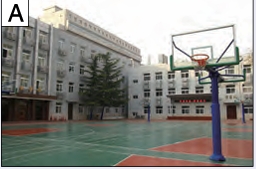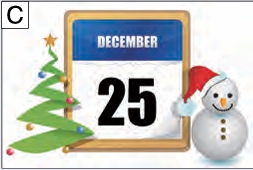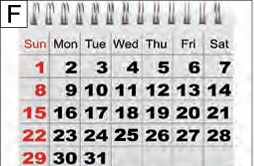给下面的词语选择对应的图片 Match the pictures with the words/phrases.






- shū 1 书
- Zhōngguó cài 2 中国 菜
- xuéxiào 3 学校
- èrshíwǔ hào 4 25 号
- yuè 5 月
- kàn shū 6 看书
在银行 In a bank 07-1
A: Qǐngwèn, jīntiān jǐ hào? 请问, 今天几号?
B: Jīntiān 9 yuè 1 hào. 今天9月1号。
A: Jīntiān xīngqí jǐ? 今天星期几?
B: Xīngqí sān. 星期三。

A: Excuse me, what’s the date today?
B: It’s September 1st.
A: What day is it today?
B: It’s Wednesday.
- New Words
- 1. 请 qǐng v. (polite) please
- *2. 问 wèn v. to ask, to inquire
- 3. 今天 jīntiān n. today
- 4. 号 hào n. (for date of month) number
- 5. 月 yuè n. month
- 6. 星期 xīngqī n. week
2 看日历 Look at the calendar 07 – 2

Zuótiān shì jǐ yuè jǐ hào?
A: 昨天 是几月几号?
Zuótiān shì bā yuè sānshíyī hào, xīngqí èr.
B: 昨天 是8 月 31 号,星期二。
Míngtiān ne?
A: 明天 呢?
Míngtiān shì jiǔ yuè èr hào, xīngqí sì.
B: 明天 是9 月2 号,星期四。
New Words
7. 昨天 zuótiān n. yesterday
8. 明天 míngtiān n. tomorrow
English Version
A: What was the date yesterday?
B: It was Tuesday, August 31st.
A: What about tomorrow?
B: It’s Thursday, September 2nd.
3 在咖啡馆儿 In a coffee house 07 – 3
Míngtiān xīngqí liù, nǐ qù xuéxiào ma?
A: 明天 星期六,你去学校 吗?
Wǒ qù xuéxiào.
B: 我去学校。
Nǐ qù xuéxiào zuò shénme?
A: 你去学校 做什么?
Wǒ qù xuéxiào kàn shū.
B: 我去学校 看书。
New Words
9. 去 qù v. to go
10. 学校 xuéxiào n. school
11. 看 kàn v. to look at, to watch, to read
12. 书 shū n. book
English Version
A: Tomorrow is Saturday. Will you go to school?
B: Yes, I will.
A: What are you going to do there?
B: I’m going there to do some reading.

注释 Notes
1 日期的表达(1):月、日(rì, date)/号、星期
Expression of a Date (1): month, date, day of the week
汉语的日期表达方式遵循由大到小的原则,先说 “月”,然后说 “日/号”,最后说 “星期”。口语一般常用 “号”。例如:
The way to say a date in Chinese observes the principle of “the bigger unit coming before the smaller one”. The month is said first, then the date and finally the day of the week. In spoken Chinese, “号” is often used instead of “日” to express the date. For example:
- 9月1号,星期三。
- 9月2号,星期四。
- 8月31号,星期二。
2 名词谓语句 Sentences with a Nominal Predicate
名词谓语句是谓语部分由名词性成分充当的句子,一般用于表达年龄、时间、日期等。例如:
A sentence with a nominal predicate is a sentence whose predicate is a nominal element. It is usually used to indicate age, time, date and so on. For example:
| Subject | Predicate |
|---|---|
| 我的汉语老师 | 33岁。 |
| 明天 | 星期三。 |
| 今天 | 9月1号。 |
3 连动句(1):去+地方+做什么
Sentences with a Serial Verb Construction (1): 去 + place + to do sth.
连动句的谓语部分由两个或者两个以上动词构成,后一个动作可以表示前一个动作的目的。第一个动词后表示地点的宾语有时可以省略。例如:
The predicate of a sentence with a serial verb construction consists of two or more verbs. The latter verb can be the purpose of the former. The object of the first verb, i.e. the place, can sometimes be omitted. For example:
| Subject | Verb1 | Verb2 |
|---|---|---|
| 去 (place) | to do sth. | |
| 我 | 去 (中国) | 学习汉语。 |
| 我们 | 去 (中国饭馆儿) | 吃中国菜。 |
| 我 | 去 (学校) | 看书。 |

Comments